
The Project Gutenberg EBook of Finger plays for nursery and kindergarten, by Emilie Poulsson This eBook is for the use of anyone anywhere at no cost and with almost no restrictions whatsoever. You may copy it, give it away or re-use it under the terms of the Project Gutenberg License included with this eBook or online at www.gutenberg.net Title: Finger plays for nursery and kindergarten Author: Emilie Poulsson Illustrator: L. J. Bridgman Release Date: March 24, 2008 [EBook #24912] Language: English Character set encoding: ISO-8859-1 *** START OF THIS PROJECT GUTENBERG EBOOK FINGER PLAYS-NURSERY, KINDERGARTEN *** Produced by Suzanne Shell, Linda Cantoni, and the Online Distributed Proofreading Team at http://www.pgdp.net. Music transcribed by Linda Cantoni. This e-book was created from a 1971 reprint published by Dover Publications, Inc., New York.
Transcriber’s Notes
This e-book was created from a modern reprint. Original publisher information has been added in brackets below. A header image for “The Lambs” is missing in the original.
Midi, PDF, and MusicXML files have been provided for the songs in this e-book. To hear a song, click on the [Listen] link. To view a song in sheet-music form, click on the [PDF] link. To view MusicXML code for a song, click on the [MusicXML] link. Lyrics contained in the music image are set forth in text below the image.
The picture parts of this e-book are best viewed at normal or medium text size.

[D. Lothrop Company, Boston, 1893]

“WHAT THE CHILD IMITATES, HE BEGINS TO UNDERSTAND.”—Froebel.
“What the child imitates,” says Froebel, “he begins to understand. Let him represent the flying of birds and he enters partially into the life of birds. Let him imitate the rapid motion of fishes in the water and his sympathy with fishes is quickened. Let him reproduce the activities of farmer, miller and baker, and his eyes open to the meaning of their work. In one word let him reflect in his play the varied aspects of life and his thought will begin to grapple with their significance.”
In all times and among all nations, finger-plays have been a delight of childhood. Countless babies have laughed and crowed over “Pat-a-cake” and other performances of the soft little hands; while children of whatever age never fail to find amusement in playing
| “Here is the church, And here’s the steeple, Open the doors, And here are the people!” |
and others as well known.
Yet it is not solely upon the pleasure derived from them, that finger-plays depend for their raison d’etre. By their judicious and early use, the development of strength and flexibility in the tiny lax fingers may be assisted, and dormant thought may receive its first awakening call through the motions which interpret as well as illustrate the phase of life or activity presented by the words.
The eighteen finger-plays contained in this book have already, through publication in Babyland, been introduced to their especial public, and have been much used in homes, though perhaps more in kindergartens. It will readily be seen that while some of the plays are for the babies in the nursery, others are more suitable for older children.
A baby-friend, ten months old, plays “All for Baby” throughout, pounding and clapping gleefully with all his might—while children seven or eight years of age play and sing “The Caterpillar,” “How the 6Corn Grew” and others with very evident enjoyment.
With a little study of the charming and expressive pictures with which the artist, Mr. L.J. Bridgman, has so sympathetically illustrated the rhymes, mothers and kindergartners have easily understood what motions were intended. To elucidate still farther, however, the playing of “The Merry Little Men” may be thus described:
During the singing of the first verse, the children look about in every direction for the “little men,” but keep the hands hidden. At the beginning of the second verse, raise both hands to full view with fingers outspread and quiet. At the words, “The first to come,” etc., let the thumbs be shown alone, then the others as named in turn, till all are again outspread as at the beginning of the second verse. In the last verse the arms are moved from side to side, hands being raised and fingers fluttering nimbly all the time. When displaying the “busy little men,” raise the hands as high as possible.
The music, composed by Miss Cornelia C. Roeske, will be found melodious and attractive and especially suited to the voices and abilities of the very young children for whom it is chiefly intended.
The harmonic arrangement is also purposely simple in consideration of the many mothers and kindergartners who cannot devote time to preparatory practice.
Emilie Poulsson.
Boston, 1889.
| PAGE | ||
| I. | The Little Men | 9 |
| II. | The Lambs | 14 |
| III. | The Hen and Chickens | 17 |
| IV. | The Little Plant | 21 |
| V. | The Pigs | 25 |
| VI. | A Little Boy’s Walk | 29 |
| VII. | The Caterpillar | 33 |
| VIII. | All for Baby | 37 |
| IX. | The Mice | 41 |
| X. | The Squirrel | 45 |
| XI. | The Sparrows | 49 |
| XII. | The Counting Lesson | 53 |
| XIII. | Mrs. Pussy’s Dinner | 57 |
| XIV. | How the Corn Grew | 61 |
| XV. | The Mill | 65 |
| XVI. | Making Bread | 69 |
| XVII. | Making Butter | 73 |
| XVIII. | Santa Claus | 77 |
DEDICATED
TO
LITTLE CHILDREN
At Home and in Kindergarten
BY THEIR FRIEND,
EMILIE POULSSON.

I.—THE LITTLE MEN.
Oh! where are the merry, merry Little Men
To join us in our play?
And where are the busy, busy Little Men
To help us work to-day?
Upon each hand
A little band
For work or play is ready.
The first to come
Is Master Thumb;
Then Pointer, strong and steady;
Then Tall Man high;
And just close by
The Feeble Man doth linger;
And last of all,
So fair and small,
The baby—Little Finger.
Yes! here are the merry, merry Little Men
To join us in our play;
And here are the busy, busy Little Men
To help us work to-day.
Emilie Poulsson. Cornelia C. Roeske.
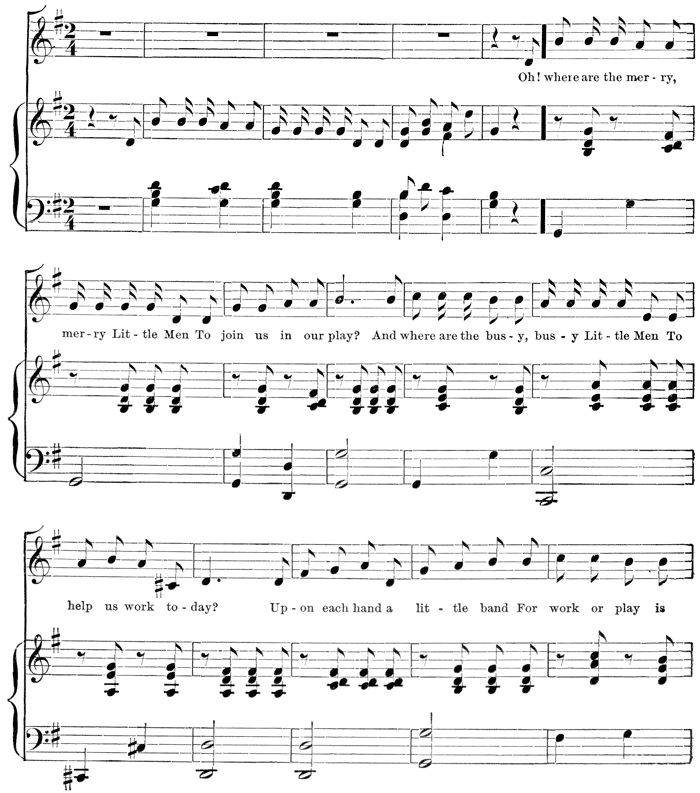
|
Oh! where are the merry, merry Little Men To join us in our play? And where are the busy, busy Little Men To help us work to-day? Upon each hand A little band For work or play is ready. The first to come Is Master Thumb; Then Pointer, strong and steady; Then Tall Man high; And just close by The Feeble Man doth linger; And last of all, So fair and small, The baby—Little Finger. Yes! here are the merry, merry Little Men To join us in our play; And here are the busy, busy Little Men To help us work to-day. |
This is the meadow where all the long day
Ten little frolicsome lambs are at play.
These are the measures the good farmer brings
Salt in, or cornmeal, and other good things.
|
This is the lambkins’ own big water-trough; Drink, little lambkins, and then scamper off! |

|
This is the rack where in winter they feed; Hay makes a very good dinner indeed. |
These are the big shears to shear the old sheep;
Dear little lambkins their soft wool may keep.
|
Here, with its big double doors shut so tight, This is the barn where they all sleep at night. |
Emilie Poulsson. Cornelia C. Roeske.
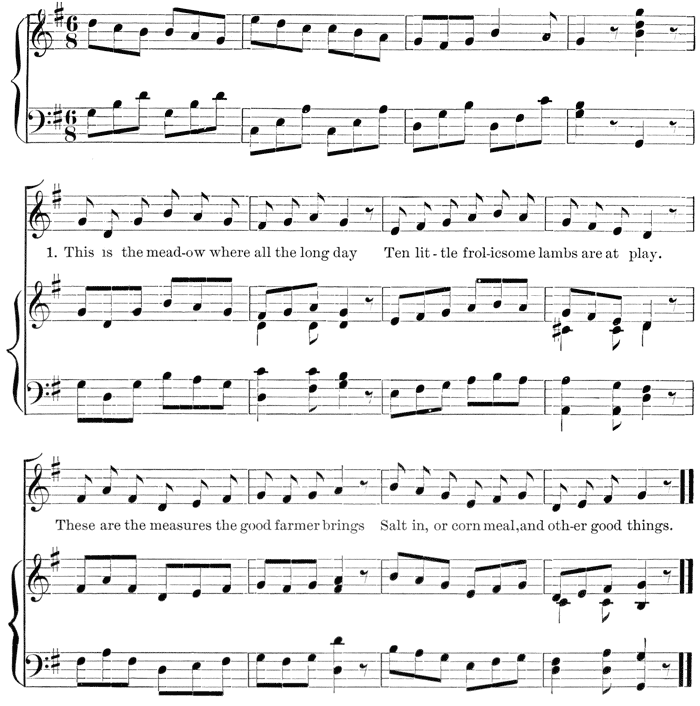
|
1. This is the meadow where all the long day Ten little frolicsome lambs are at play. These are the measures the good farmer brings Salt in, or corn meal, and other good things. |
|
2. This is the lambkins’ own big water-trough; Drink, little lambkins, and then scamper off! This is the rack where in winter they feed; Hay makes a very good dinner indeed. |
3. These are the big shears to shear the old sheep; Dear little lambkins their soft wool may keep. Here, with its big double doors shut so tight, This is the barn where they all sleep at night. |
III.—THE HEN AND CHICKENS.
Good Mother Hen sits here on her nest,
Keeps the eggs warm beneath her soft breast,
Waiting, waiting, day after day.
Hark! there’s a sound she knows very well:
Some little chickens are breaking the shell,
Pecking, pecking, pecking away.
Now they’re all out, Oh, see what a crowd!
Good Mother Hen is happy and proud,
Cluck-cluck, cluck-cluck, clucking away.
Into the coop the mother must go;
But all the chickens run to and fro,
Peep-peep, peep-peep, peeping away.
Here is some corn in my little dish;
Eat, Mother Hen, eat all that you wish,
Picking, picking, picking away.
Happy we’ll be to see you again,
Dear little chicks and good Mother Hen!
Now good-by, good-by for to-day.
Emilie Poulsson. Cornelia C. Roeske.
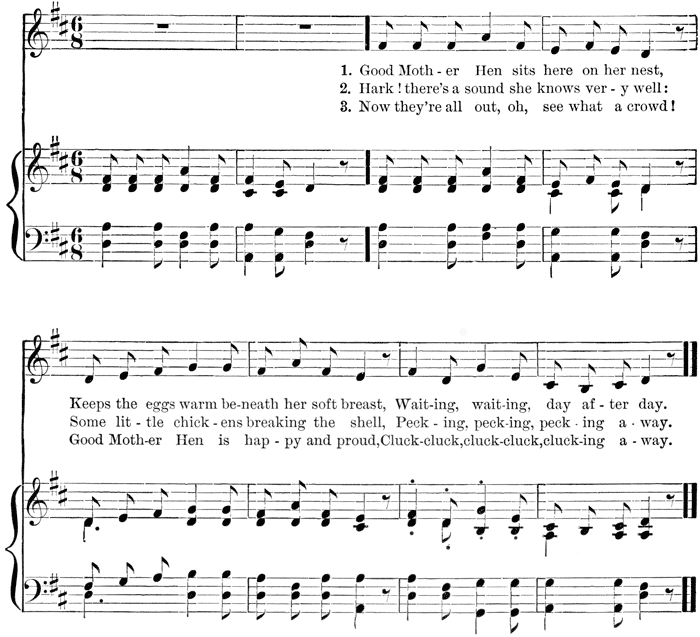
|
1. Good Mother Hen sits here on her nest, Keeps the eggs warm beneath her soft breast, Waiting, waiting, day after day. |
2. Hark! there’s a sound she knows very well: Some little chickens breaking the shell, Pecking, pecking, pecking away. |
| 3. Now they’re all out, oh, see what a crowd! Good Mother Hen is happy and proud, Cluck-cluck, cluck-cluck, clucking away. |
| 4. Into the coop the mother must go; While all the chickens run to and fro, Peep-peep, peep-peep, peeping away. |
5. Here is some corn in my little dish; Eat, Mother Hen, eat all that you wish. Picking, picking, picking away. |
| 6. Happy we’ll be to see you again, Dear little chicks and good Mother Hen! Now good-bye, good-bye for to-day. |
IV.—THE LITTLE PLANT.
In my little garden bed
Raked so nicely over,
First the tiny seeds I sow,
Then with soft earth cover.
Shining down, the great round sun
Smiles upon it often;
Little raindrops, pattering down,
Help the seeds to soften.
Then the little plant awakes!
Down the roots go creeping.
Up it lifts its little head
Through the brown mould peeping.
High and higher still it grows
Through the summer hours,
Till some happy day the buds
Open into flowers.
Emilie Poulsson. C.C. Roeske.
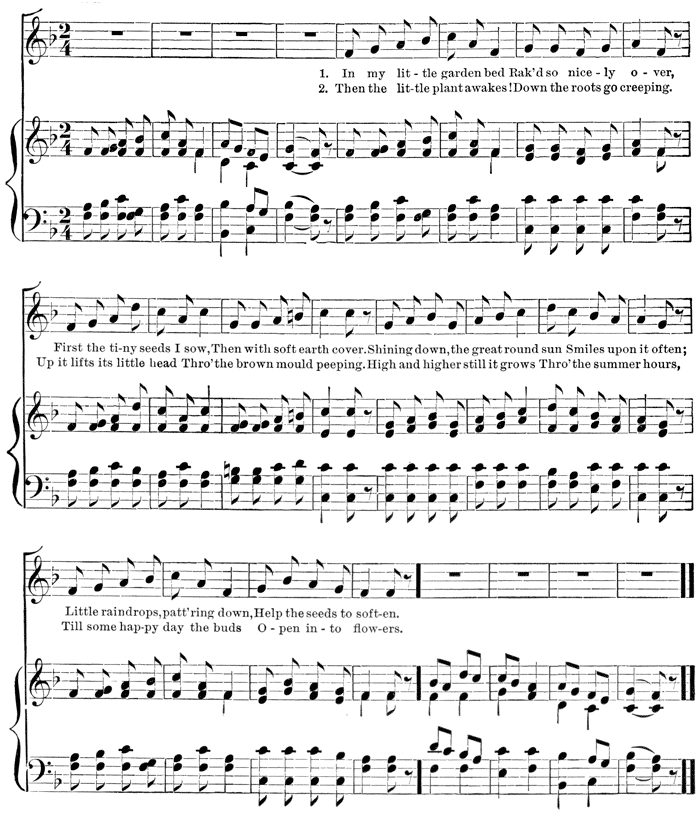
|
1. In my little garden bed Rak’d so nicely over, First the tiny seeds I sow, Then with soft earth cover. Shining down, the great round sun Smiles upon it often; Little raindrops, patt’ring down, Help the seeds to soften. 2. Then the little plant awakes! Down the roots go creeping. Up it lifts its little head Thro’ the brown mould peeping. High and higher still it grows Thro’ the summer hours, Till some happy day the buds Open into flowers. |
V.—THE PIGS.
Piggie Wig and Piggie Wee,
Hungry pigs as pigs could be,
For their dinner had to wait
Down behind the barnyard gate.
Piggie Wig and Piggie Wee
Climbed the barnyard gate to see,
Peeping through the gate so high,
But no dinner could they spy.
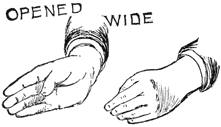 Piggie Wig and Piggie Wee
Piggie Wig and Piggie Wee
Got down sad as pigs could be;
But the gate soon opened wide
And they scampered forth outside.
Piggie Wig and Piggie Wee,
What was their delight to see
Dinner ready not far off—
Such a full and tempting trough!

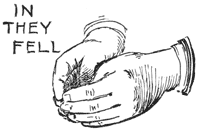 Piggie Wig and Piggie Wee,
Piggie Wig and Piggie Wee,
Greedy pigs as pigs could be,
For their dinner ran pell-mell;
In the trough both piggies fell.
Emilie Poulsson. Cornelia C. Roeske.
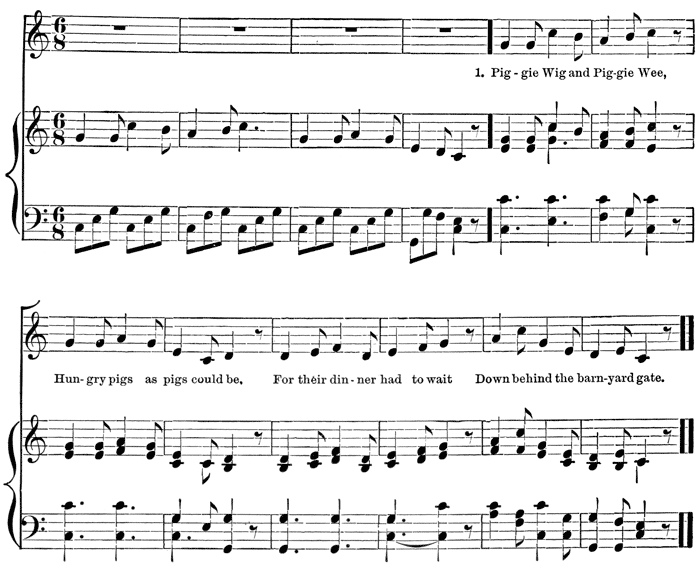
|
1. Piggie Wig and Piggie Wee, Hungry pigs as pigs could be, For their dinner had to wait Down behind the barnyard gate. |
| 2. Piggie Wig and Piggie Wee Climbed the barnyard gate to see, Peeping through the gate so high, But no dinner could they spy. |
3. Piggie Wig and Piggie Wee Got down sad as pigs could be; But the gate soon opened wide And they scampered forth outside. |
| 4. Piggie Wig and Piggie Wee, What was their delight to see Dinner ready not far off— Such a full and tempting trough! |
5. Piggie Wig and Piggie Wee, Greedy pigs as pigs could be, For their dinner ran pell-mell; In the trough both piggies fell. |
VI.—A LITTLE BOY’S WALK.
A little boy went walking
One lovely summer’s day:
He saw a little rabbit
That quickly ran away;
He saw a shining river
Go winding in and out,
And little fishes in it
Were swimming all about;
And, slowly, slowly turning,
The great wheel of the mill;
And then the tall church steeple,
The little church so still;
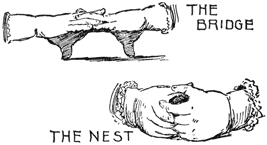 The bridge above the water;
The bridge above the water;
And when he stopped to rest,
He saw among the bushes
A wee ground-sparrow’s nest.
And as he watched the birdies
Above the tree-tops fly,
He saw the clouds a-sailing
Across the sunny sky.
He saw the insects playing;
The flowers that summer brings;
He said, “I’ll go tell mamma!
I’ve seen so many things!”
Emilie Poulsson. Cornelia C. Roeske.
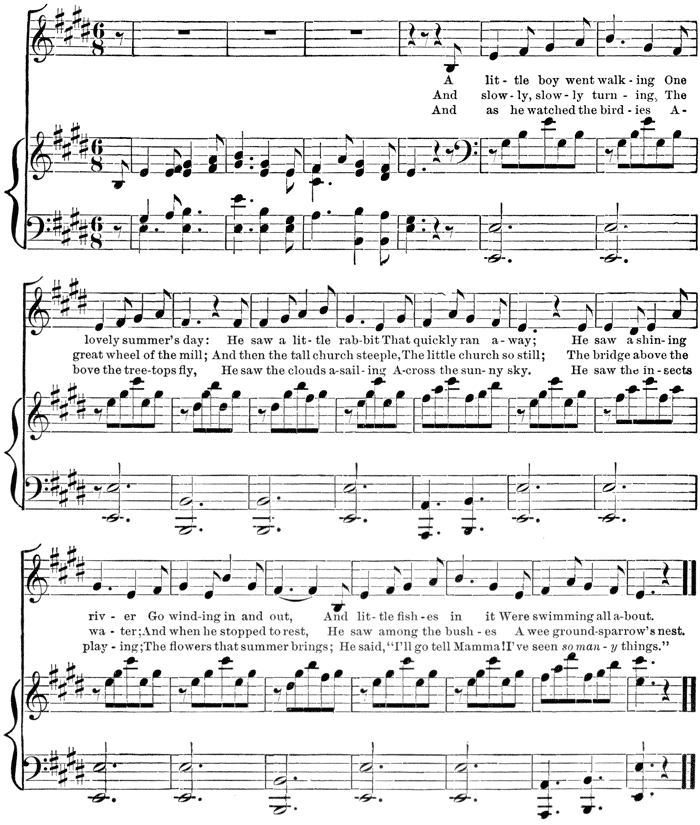
|
A little boy went walking One lovely summer’s day: He saw a little rabbit That quickly ran away; He saw a shining river Go winding in and out, And little fishes in it Were swimming all about. And slowly, slowly turning, The great wheel of the mill; And then the tall church steeple, The little church so still; The bridge above the water; And when he stopped to rest, He saw among the bushes A wee ground-sparrow’s nest, And as he watched the birdies Above the tree-tops fly, He saw the clouds a-sailing Across the sunny sky. He saw the insects playing; The flowers that summer brings; He said, “I’ll go tell Mamma! I’ve seen so many things.” |
VII.—THE CATERPILLAR.
Fuzzy little caterpillar,
Crawling, crawling on the ground!
Fuzzy little caterpillar,
Nowhere, nowhere to be found,
Though we’ve looked and looked and hunted
Everywhere around!
When the little caterpillar
Found his furry coat too tight,
Then a snug cocoon he made him
Spun of silk so soft and light;
Rolled himself away within it—
Slept there day and night.
See how this cocoon is stirring!
Now a little head we spy—
What! Is this our caterpillar
Spreading gorgeous wings to dry?
Soon the free and happy creature
Flutters gayly by.
Emilie Poulsson. Cornelia C. Roeske.
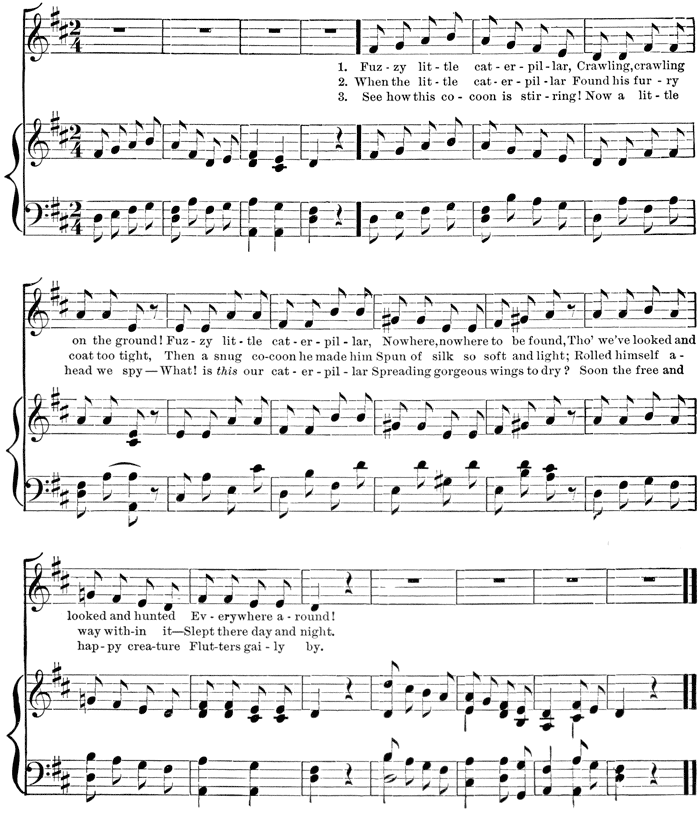
|
1. Fuzzy little caterpillar, Crawling, crawling on the ground! Fuzzy little caterpillar, Nowhere, nowhere to be found, Tho’ we’ve looked and looked and hunted Everywhere around! 2. When the little caterpillar Found his furry coat too tight, Then a snug cocoon he made him Spun of silk so soft and light; Rolled himself away within it— Slept there day and night. 3. See how this cocoon is stirring! Now a little head we spy— What! is this our caterpillar Spreading gorgeous wings to dry? Soon the free and happy creature Flutters gaily by. |
VIII.—ALL FOR BABY.
Here’s a ball for Baby,
Big and soft and round!
Here is Baby’s hammer—
O, how he can pound!
Here is Baby’s music—
Clapping, clapping so!
Here are Baby’s soldiers,
Standing in a row!
Here’s the Baby’s trumpet,
Toot-too-toot! too-too!
Here’s the way that Baby
Plays at “Peep-a-boo!”
Here’s a big umbrella—
Keep the Baby dry!
Here’s the Baby’s cradle—
Rock-a-baby-by!
Emilie Poulsson. Cornelia C. Roeske.
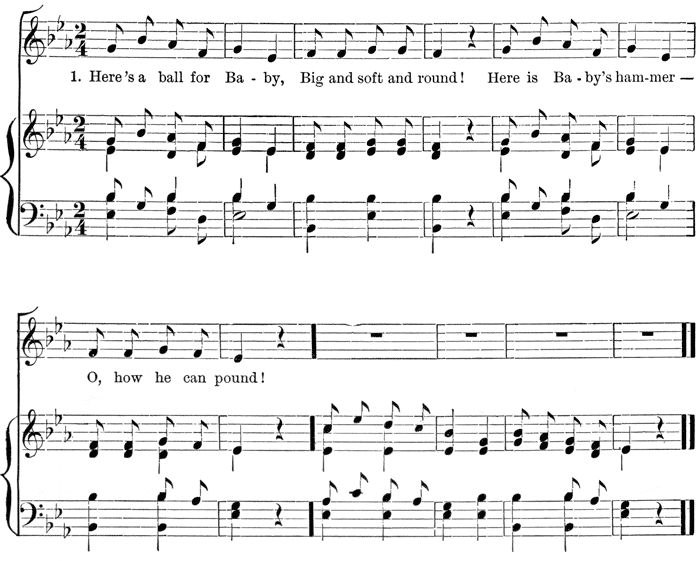
| 1. Here’s a ball for Baby, Big and soft and round! Here is Baby’s hammer— O, how he can pound! |
||
| 2. Here is Baby’s music Clapping, clapping so! Here are Baby’s soldiers, Standing in a row! |
3. Here’s the Baby’s trumpet, Toot-too-toot! too-too! Here’s the way that Baby Plays at “Peep-a-boo!” |
|
| 4. Here’s a big umbrella— Keeps the Baby dry! Here’s the Baby’s cradle— Rock-a-baby by! |
IX.—THE MICE.
Five little mice on the pantry floor,
Seeking for bread-crumbs or something more;
Five little mice on the shelf up high,
Feasting so daintily on a pie—
But the big round eyes of the wise old cat
See what the five little mice are at.
Quickly she jumps!—but the mice run away,
And hide in their snug little holes all day.
“Feasting in pantries may be very nice;
But home is the best!” say the five little mice.
Emilie Poulsson. Cornelia C. Roeske.
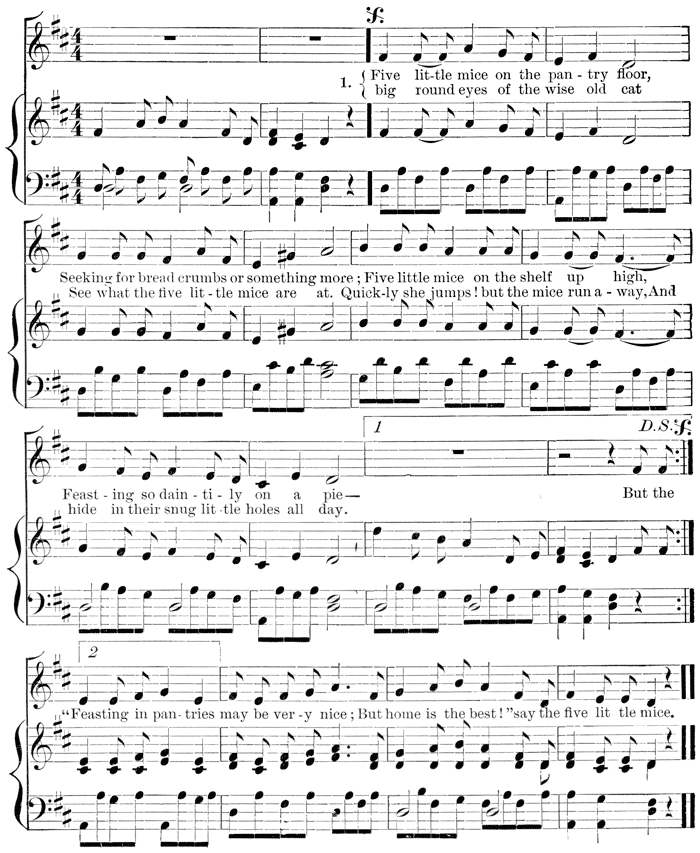
|
1. Five little mice on the pantry floor, Seeking for bread crumbs or something more; Five little mice on the shelf up high, Feasting so daintily on a pie— But the big round eyes of the wise old cat See what the five little mice are at. Quickly she jumps! but the mice run away. And hide in their snug little holes all day. “Feasting in pantries may be very nice; But home is the best!” say the five little mice. |
X.—THE SQUIRREL
“Little squirrel, living there
In the hollow tree,
I’ve a pretty cage for you;
Come and live with me!
“You may turn the little wheel—
That will be great fun!
Slowly round, or very fast
If you faster run.
“Little squirrel, I will bring
In my basket here
Every day a feast of nuts!
Come, then, squirrel dear.”
But the little squirrel said
From his hollow tree:
“Oh! no, no! I’d rather far
Live here and be free!”
So my cage is empty yet,
And the wheel is still;
But my little basket here
Oft with nuts I fill.
If you like, I’ll crack the nuts,
Some for you and me,
For the squirrel has enough
In his hollow tree.
Emilie Poulsson. Cornelia C. Roeske.
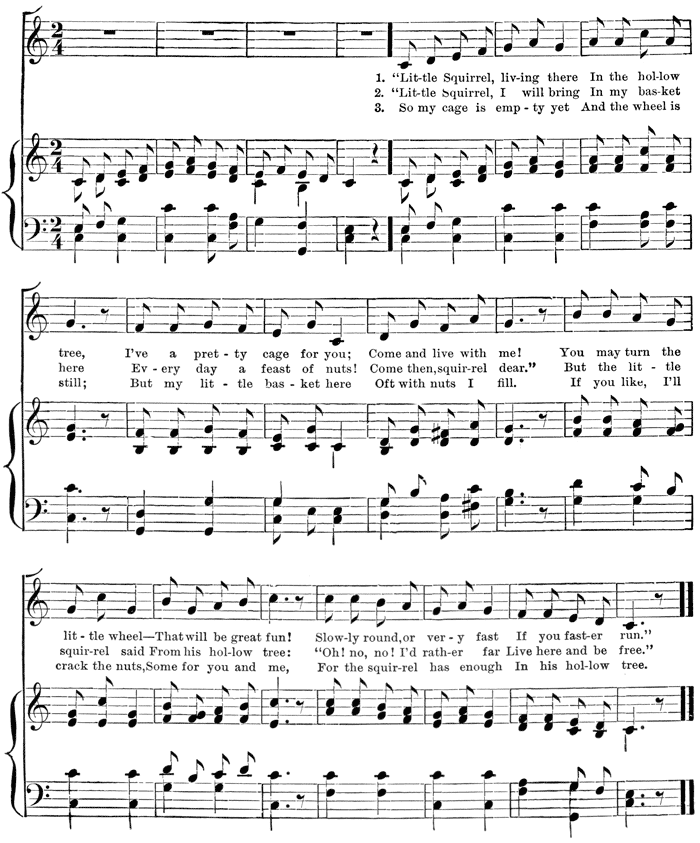
|
1. “Little Squirrel, living there In the hollow tree, I’ve a pretty cage for you; Come and live with me! You may turn the little wheel— That will be great fun! Slowly round, or very fast If you faster run.” 2. “Little Squirrel, I will bring In my basket here Every day a feast of nuts! Come then, squirrel dear.” But the little squirrel said From his hollow tree: “Oh! no, no! I’d rather far Live here and be free.” 3. So my cage is empty yet And the wheel is still; But my little basket here Oft with nuts I fill. If you like, I’ll crack the nuts, Some for you and me, For the squirrel has enough In his hollow tree. |
XI.—THE SPARROWS.
“Little brown sparrows,
Flying around,
Up in the tree-tops,
Down on the ground,
“Come to my window,
Dear sparrows, come!
See! I will give you
Many a crumb.
“Here is some water,
Sparkling and clear;
Come, little sparrows,
Drink without fear.
“If you are tired,
Here is a nest;
Wouldn’t you like to
Come here to rest?”
All the brown sparrows
Flutter away,
Chirping and singing,
“We cannot stay;
“For in the tree-tops,
’Mong the gray boughs,
There is the sparrows’
Snug little house.”
Emilie Poulsson. C.C. Roeske.
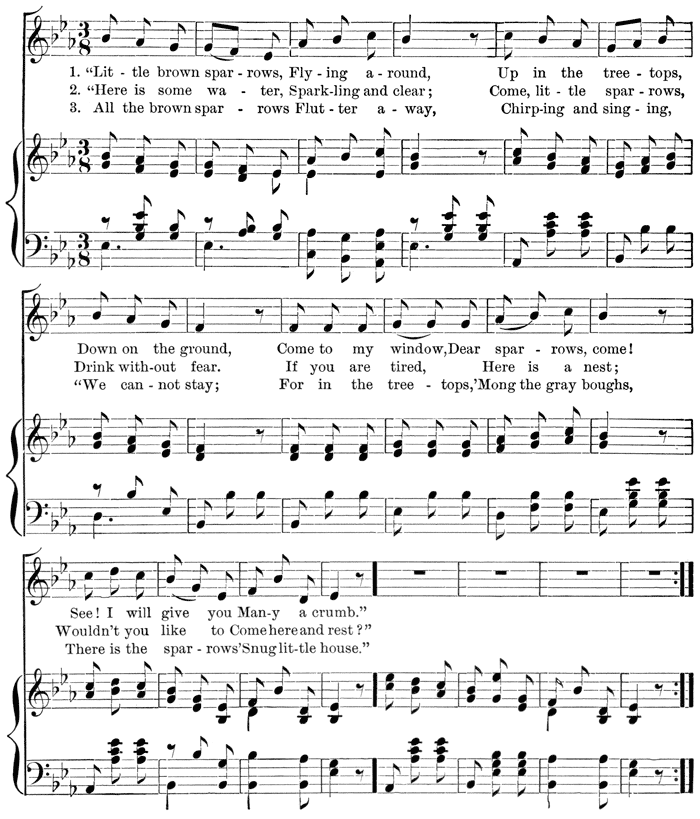
|
1. “Little brown sparrows, Flying around, Up in the tree-tops, Down on the ground, Come to my window, Dear sparrows, come! See! I will give you Many a crumb.” 2. “Here is some water, Sparkling and clear; Come, little sparrows, Drink without fear. If you are tired, Here is a nest; Wouldn’t you like to Come here and rest?” 3. All the brown sparrows Flutter away, Chirping and singing, “We cannot stay; For in the tree-tops, ’Mong the gray boughs, There is the sparrows’ Snug little house.” |
XII.—THE COUNTING LESSON.
| (Right hand.) Here is the beehive. Where are the bees? Hidden away where nobody sees. Soon they come creeping out of the hive— One!—two!—three! four! five! |
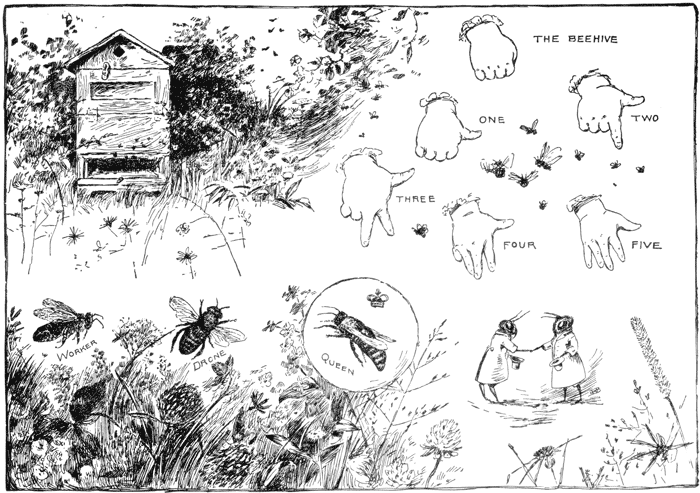
(Left hand.)
Once I saw an ant-hill
With no ants about;
So I said, “Dear little ants,
Won’t you please come out?”
Then as if the little ants
Had heard my call—
One! two! three! four! five came out!
And that was all!
Emilie Poulsson. C.C. Roeske.
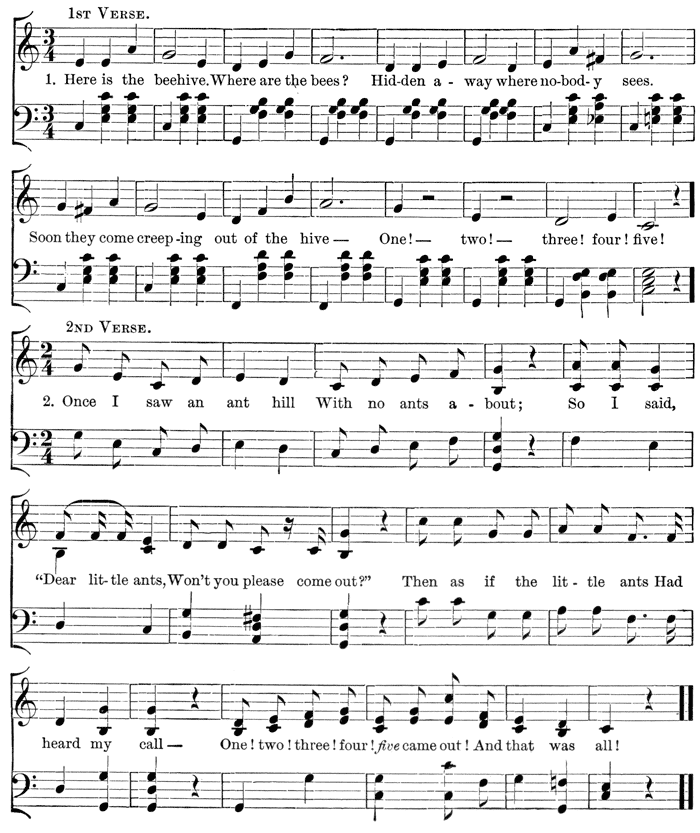
|
1st Verse. 1. Here is the beehive. Where are the bees? Hidden away where nobody sees. Soon they come creeping out of the hive— One!—two!—three! four! five! 2nd Verse. 2. Once I saw an ant hill With no ants about; So I said, “Dear little ants, Won’t you please come out?” Then as if the little ants Had heard my call— One! two! three! four! five came out! And that was all! |
XIII.—MRS. PUSSY’S DINNER.
Mrs. Pussy, sleek and fat,
With her kittens four,
Went to sleep upon the mat
By the kitchen door.
Mrs. Pussy heard a noise—
Up she jumped in glee:
“Kittens, maybe that’s a mouse!
Let us go and see!”
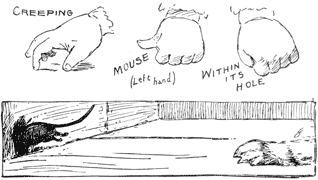
Creeping, creeping, creeping on,
Silently they stole;
But the little mouse had gone
Back within its hole.
“Well,” said Mrs. Pussy then,
“To the barn we’ll go;
We shall find the swallow there
Flying to and fro.”
So the cat and kittens four
Tried their very best;
But the swallows flying fast
Safely reached the nest!
Home went hungry Mrs. Puss
And her kittens four;
Found their dinner on a plate
By the kitchen door.
As they gathered round the plate,
They agreed ’twas nice
That it could not run away
Like the birds and mice!
Emilie Poulsson. C.C. Roeske.
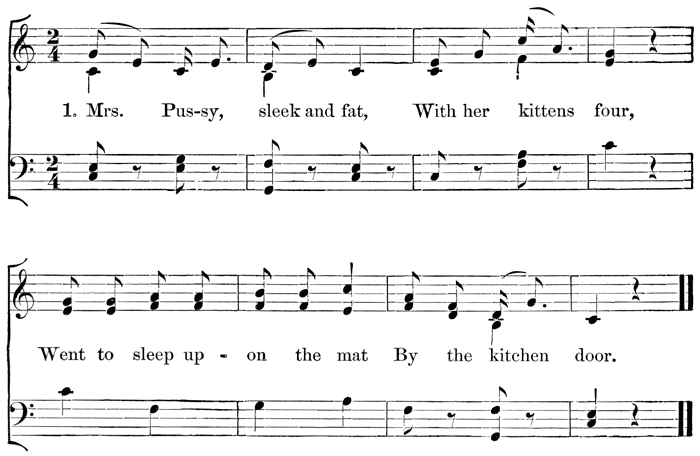
|
1. Mrs. Pussy, sleek and fat, With her kittens four, Went to sleep upon the mat By the kitchen door. |
|
2. Mrs. Pussy heard a noise— Up she jumped in glee: “Kittens, maybe that’s a mouse! Let us go and see!” |
3. Creeping, creeping, creeping on, Silently they stole; But the little mouse had gone Back within its hole. |
| 4. “Well,” said Mrs. Pussy then, “To the barn we’ll go; We shall find the swallows there Flying to and fro.” |
5. So the cat and kittens four Tried their very best; But the swallows flying fast Safely reached the nest! |
| 6. Home went hungry Mrs. Puss And her kittens four; Found their dinner on a plate By the kitchen door. |
7. As they gathered round the plate, They agreed ’twas nice That it could not run away Like the birds and mice! |
XIV.—HOW THE CORN GREW.
There was a field that waiting lay,
All hard and brown and bare;
There was a thrifty farmer came
And fenced it in with care.
Then came a plowman with his plow;
From early until late,
Across the field and back again,
He plowed the furrows straight.
The harrow then was brought to make
The ground more soft and loose;
And soon the farmer said with joy,
“My field is fit for use.”
For many days the farmer then
Was working with his hoe;
And little Johnny brought the corn
And dropped the kernels—so!
And there they lay, until awaked
By tapping rains that fell,
Then pushed their green plumes up to greet
The sun they loved so well.
Then flocks and flocks of hungry crows
Came down the corn to taste;
But ba-ang!—went the farmer’s gun
And off they flew in haste.
Then grew and grew the corn, until,
When autumn days had come,
With sickles keen they cut it down,
And sang the “Harvest Home.”
Emilie Poulsson. Cornelia C. Roeske.
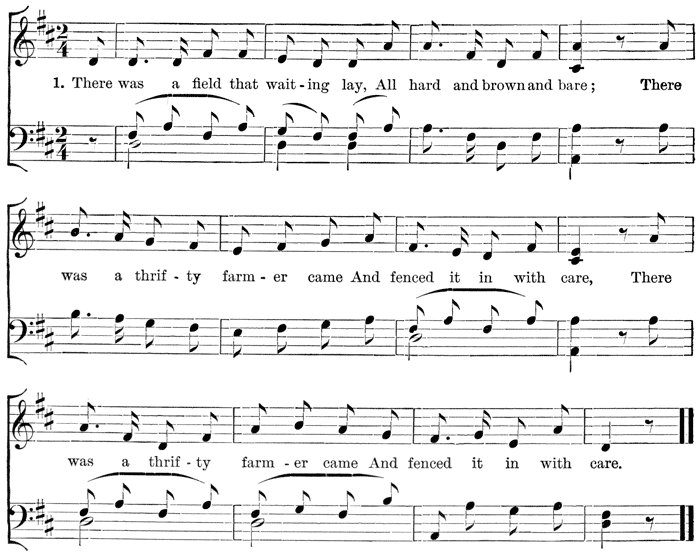
|
1. There was a field that waiting lay, All hard and brown and bare; There was a thrifty farmer came And fenced it in with care, There was a thrifty farmer came And fenced it in with care. |
|
2. Then came a ploughman with his plough; From early until late, Across the field and back again, He ploughed the furrows straight. |
3. The harrow then was brought to make The ground more soft and loose; And soon the farmer said with joy, “My field is fit for use.” |
| 4. For many days the farmer then Was working with his hoe; And little Johnny brought the corn And dropped the kernels—so! |
5. And there they lay, until awaked By tapping rains that fell, Then pushed their green plumes up to greet The sun they loved so well. |
| 6. Then flocks and flocks of hungry crows Came down the corn to taste; But ba-ang! went the farmer’s gun, And off they flew in haste. |
7. Then grew and grew the corn, until, When autumn days had come, With sickles keen they cut it down, And sang the “Harvest Home.” |
XV.—THE MILL.
A merry little river
Went singing day by day,
Until it reached a mill-dam
That stretched across its way.
And there it spread its waters,
A quiet pond, to wait
Until the busy miller
Should lift the water-gate.
Then, hurrying through the gateway,
The dashing waters found
A mighty millwheel waiting,
And turned it swiftly round.
But faster turned the millstones
Up in the dusty mill,
And quickly did the miller
With corn the hopper fill.
And faster yet and faster
The heavy stones went round,
Until the golden kernels
To golden meal were ground.
“Now fill the empty hopper
With wheat,” the miller said;
“We’ll grind this into flour
To make the children’s bread.”
And still, as flowed the water,
The mighty wheel went round;
And still, as turned the millstones,
The corn and grain were ground.
And busy was the miller
The livelong day, until
The water-gate he fastened,
And silent grew the mill.
Emilie Poulsson. Cornelia C. Roeske.
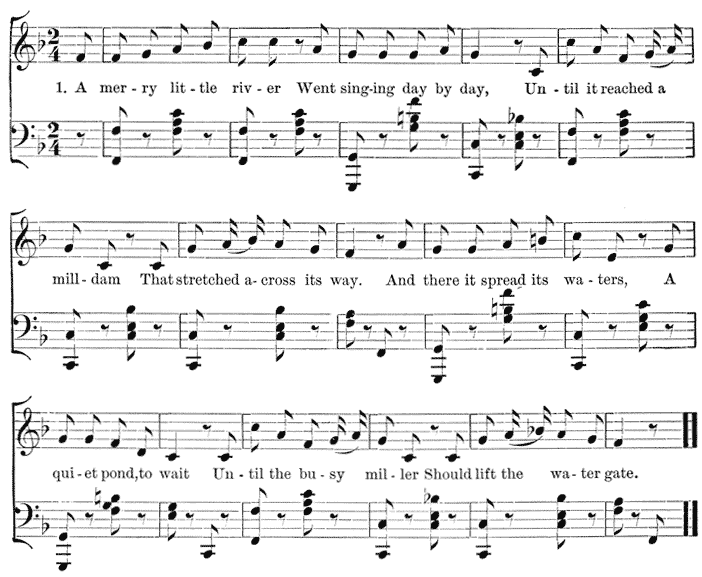
|
1. A merry little river Went singing day by day, Until it reached a mill-dam That stretched across its way. And there it spread its waters, A quiet pond, to wait Until the busy miller Should lift the water gate. |
2. Then, hurrying through the gateway, The dashing waters found A mighty millwheel waiting— And turned it swiftly round. But faster turned the millstone Up in the dusty mill, And quickly did the miller With corn the hopper fill. |
| 3. And faster yet and faster The heavy stones went round, Until the golden kernels To golden meal were ground. “Now, fill the empty hopper With wheat,” the miller said; “We’ll grind this into flour To make the children’s bread.” |
4. And still, as flowed the water, The mighty wheel went round; And still, as turned the millstones, The corn and grain were ground. And busy was the miller The livelong day, until The water gate he fastened, And silent grew the mill. |
XVI.—MAKING BREAD.
“The farmer and the miller
Have worked,” the mother said,
“And got the flour ready,
So I will make the bread.”
She scooped from out the barrel
The flour white as snow,
And in her sieve she put it
And shook it to and fro.
Then in the pan of flour
A little salt she threw;
A cup of yeast she added,
And poured in water, too.
To mix them all together
She stirred with busy might,
Then covered it and left it
Until the bread was light.
More flour then she sifted
And kneaded well the dough,
And in the waiting oven
The loaves of bread did go.
The mother watched the baking,
And turned the loaves, each one,
Until at last, rejoicing,
She said, “My bread is done!”
Emilie Poulsson. C.C. Roeske.
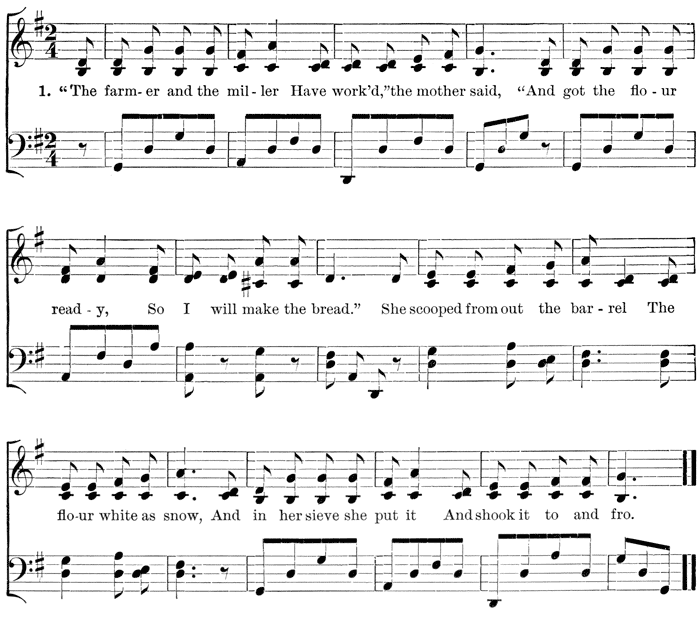
|
1. “The farmer and the miller Have work’d,” the mother said, “And got the flour ready, So I will make the bread.” She scooped from out the barrel The flour white as snow, And in her sieve she put it And shook it to and fro. |
| 2. Then in the pan of flour A little salt she threw; A cup of yeast she added, And poured in water, too. To mix them all together She stirred with busy might, Then covered it and left it Until the bread was light. |
3. More flour then she sifted And kneaded well the dough, And in the waiting oven The loaves of bread did go. The mother watched the baking, And turned the loaves, each one, Until at last, rejoicing, She said, “My bread is done!” |
XVII.—MAKING BUTTER.
Skim, skim, skim,
With the skimmer bright;
Take the rich and yellow cream,
Leave the milk so white.
Churn, churn, churn,
Now ’tis churning day;
Till the cream to butter turn
Dasher must not stay.
Press, press, press;
All the milk must be
From the golden butter now
Pressed out carefully.
Pat, pat, pat;
Make it smooth and round.
See! the roll of butter’s done—
Won’t you buy a pound?
Taste, oh! taste,
This is very nice;
Spread it on the children’s bread,
Give them each a slice.
Emilie Poulsson. C.C. Roeske.
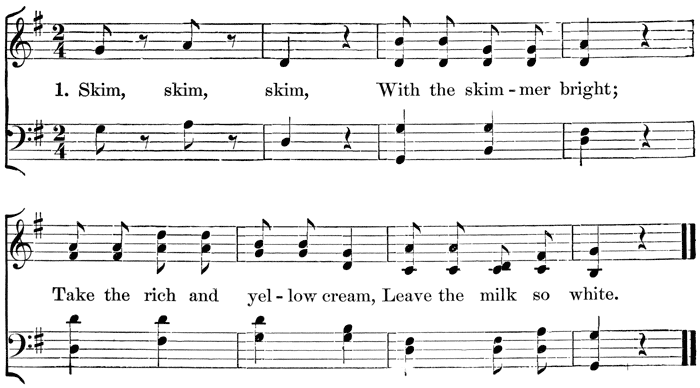
|
1. Skim, skim, skim, With the skimmer bright; Take the rich and yellow cream, Leave the milk so white. |
|
| 2. Churn, churn, churn, Now ’tis churning day; Till the cream to butter turn Dasher must not stay. |
|
| 3. Press, press, press; All the milk must be From the golden butter now Pressed out carefully. |
|
| 4. Pat, pat, pat, Make it smooth and round. See! the roll of butter’s done— Won’t you buy a pound? |
|
| 5. Taste, oh! taste, This is very nice. Spread it on the children’s bread, Give them each a slice. |
XVIII.—SANTA CLAUS.
O, clap, clap the hands,
And sing out with glee
For Christmas is coming
And merry are we!
Now swift o’er the snow
The tiny reindeer
Are trotting and bringing
Good Santa Claus near.
Our stockings we’ll hang,
And while we’re asleep
Then down through the chimney
Will Santa Claus creep.
He’ll empty his pack,
Then up he will come
And, calling his reindeer,
Will haste away home.
Then clap, clap the hands!
And sing out with glee,
For Christmas is coming
And merry are we!
Emilie Poulsson. Cornelia C. Roeske.
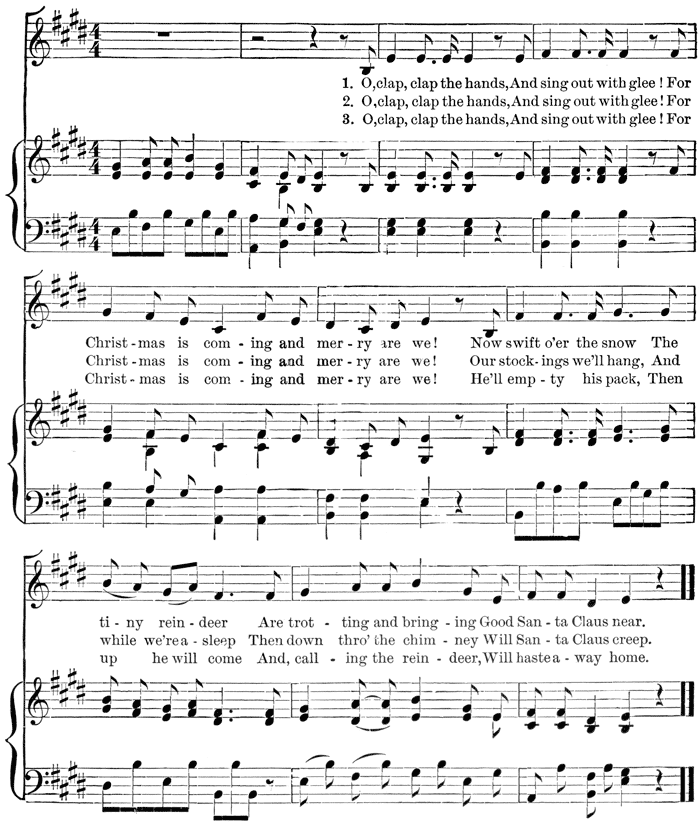
|
1. O, clap, clap the hands, And sing out with glee! For Christmas is coming and merry are we! Now swift o’er the snow The tiny reindeer Are trotting and bringing Good Santa Claus near. 2. O, clap, clap the hands, And sing out with glee! For Christmas is coming and merry are we! Our stockings we’ll hang, And while we’re asleep Then down thro’ the chimney Will Santa Claus creep. 3. O, clap, clap the hands, And sing out with glee! For Christmas is coming and merry are we! He’ll empty his pack, Then up he will come And calling the reindeer, Will haste away home. |
End of the Project Gutenberg EBook of Finger plays for nursery and
kindergarten, by Emilie Poulsson
*** END OF THIS PROJECT GUTENBERG EBOOK FINGER PLAYS-NURSERY, KINDERGARTEN ***
***** This file should be named 24912-h.htm or 24912-h.zip *****
This and all associated files of various formats will be found in:
http://www.gutenberg.org/2/4/9/1/24912/
Produced by Suzanne Shell, Linda Cantoni, and the Online
Distributed Proofreading Team at http://www.pgdp.net. Music
transcribed by Linda Cantoni. This e-book was created from
a 1971 reprint published by Dover Publications, Inc., New
York.
Updated editions will replace the previous one--the old editions
will be renamed.
Creating the works from public domain print editions means that no
one owns a United States copyright in these works, so the Foundation
(and you!) can copy and distribute it in the United States without
permission and without paying copyright royalties. Special rules,
set forth in the General Terms of Use part of this license, apply to
copying and distributing Project Gutenberg-tm electronic works to
protect the PROJECT GUTENBERG-tm concept and trademark. Project
Gutenberg is a registered trademark, and may not be used if you
charge for the eBooks, unless you receive specific permission. If you
do not charge anything for copies of this eBook, complying with the
rules is very easy. You may use this eBook for nearly any purpose
such as creation of derivative works, reports, performances and
research. They may be modified and printed and given away--you may do
practically ANYTHING with public domain eBooks. Redistribution is
subject to the trademark license, especially commercial
redistribution.
*** START: FULL LICENSE ***
THE FULL PROJECT GUTENBERG LICENSE
PLEASE READ THIS BEFORE YOU DISTRIBUTE OR USE THIS WORK
To protect the Project Gutenberg-tm mission of promoting the free
distribution of electronic works, by using or distributing this work
(or any other work associated in any way with the phrase "Project
Gutenberg"), you agree to comply with all the terms of the Full Project
Gutenberg-tm License (available with this file or online at
http://gutenberg.net/license).
Section 1. General Terms of Use and Redistributing Project Gutenberg-tm
electronic works
1.A. By reading or using any part of this Project Gutenberg-tm
electronic work, you indicate that you have read, understand, agree to
and accept all the terms of this license and intellectual property
(trademark/copyright) agreement. If you do not agree to abide by all
the terms of this agreement, you must cease using and return or destroy
all copies of Project Gutenberg-tm electronic works in your possession.
If you paid a fee for obtaining a copy of or access to a Project
Gutenberg-tm electronic work and you do not agree to be bound by the
terms of this agreement, you may obtain a refund from the person or
entity to whom you paid the fee as set forth in paragraph 1.E.8.
1.B. "Project Gutenberg" is a registered trademark. It may only be
used on or associated in any way with an electronic work by people who
agree to be bound by the terms of this agreement. There are a few
things that you can do with most Project Gutenberg-tm electronic works
even without complying with the full terms of this agreement. See
paragraph 1.C below. There are a lot of things you can do with Project
Gutenberg-tm electronic works if you follow the terms of this agreement
and help preserve free future access to Project Gutenberg-tm electronic
works. See paragraph 1.E below.
1.C. The Project Gutenberg Literary Archive Foundation ("the Foundation"
or PGLAF), owns a compilation copyright in the collection of Project
Gutenberg-tm electronic works. Nearly all the individual works in the
collection are in the public domain in the United States. If an
individual work is in the public domain in the United States and you are
located in the United States, we do not claim a right to prevent you from
copying, distributing, performing, displaying or creating derivative
works based on the work as long as all references to Project Gutenberg
are removed. Of course, we hope that you will support the Project
Gutenberg-tm mission of promoting free access to electronic works by
freely sharing Project Gutenberg-tm works in compliance with the terms of
this agreement for keeping the Project Gutenberg-tm name associated with
the work. You can easily comply with the terms of this agreement by
keeping this work in the same format with its attached full Project
Gutenberg-tm License when you share it without charge with others.
1.D. The copyright laws of the place where you are located also govern
what you can do with this work. Copyright laws in most countries are in
a constant state of change. If you are outside the United States, check
the laws of your country in addition to the terms of this agreement
before downloading, copying, displaying, performing, distributing or
creating derivative works based on this work or any other Project
Gutenberg-tm work. The Foundation makes no representations concerning
the copyright status of any work in any country outside the United
States.
1.E. Unless you have removed all references to Project Gutenberg:
1.E.1. The following sentence, with active links to, or other immediate
access to, the full Project Gutenberg-tm License must appear prominently
whenever any copy of a Project Gutenberg-tm work (any work on which the
phrase "Project Gutenberg" appears, or with which the phrase "Project
Gutenberg" is associated) is accessed, displayed, performed, viewed,
copied or distributed:
This eBook is for the use of anyone anywhere at no cost and with
almost no restrictions whatsoever. You may copy it, give it away or
re-use it under the terms of the Project Gutenberg License included
with this eBook or online at www.gutenberg.net
1.E.2. If an individual Project Gutenberg-tm electronic work is derived
from the public domain (does not contain a notice indicating that it is
posted with permission of the copyright holder), the work can be copied
and distributed to anyone in the United States without paying any fees
or charges. If you are redistributing or providing access to a work
with the phrase "Project Gutenberg" associated with or appearing on the
work, you must comply either with the requirements of paragraphs 1.E.1
through 1.E.7 or obtain permission for the use of the work and the
Project Gutenberg-tm trademark as set forth in paragraphs 1.E.8 or
1.E.9.
1.E.3. If an individual Project Gutenberg-tm electronic work is posted
with the permission of the copyright holder, your use and distribution
must comply with both paragraphs 1.E.1 through 1.E.7 and any additional
terms imposed by the copyright holder. Additional terms will be linked
to the Project Gutenberg-tm License for all works posted with the
permission of the copyright holder found at the beginning of this work.
1.E.4. Do not unlink or detach or remove the full Project Gutenberg-tm
License terms from this work, or any files containing a part of this
work or any other work associated with Project Gutenberg-tm.
1.E.5. Do not copy, display, perform, distribute or redistribute this
electronic work, or any part of this electronic work, without
prominently displaying the sentence set forth in paragraph 1.E.1 with
active links or immediate access to the full terms of the Project
Gutenberg-tm License.
1.E.6. You may convert to and distribute this work in any binary,
compressed, marked up, nonproprietary or proprietary form, including any
word processing or hypertext form. However, if you provide access to or
distribute copies of a Project Gutenberg-tm work in a format other than
"Plain Vanilla ASCII" or other format used in the official version
posted on the official Project Gutenberg-tm web site (www.gutenberg.net),
you must, at no additional cost, fee or expense to the user, provide a
copy, a means of exporting a copy, or a means of obtaining a copy upon
request, of the work in its original "Plain Vanilla ASCII" or other
form. Any alternate format must include the full Project Gutenberg-tm
License as specified in paragraph 1.E.1.
1.E.7. Do not charge a fee for access to, viewing, displaying,
performing, copying or distributing any Project Gutenberg-tm works
unless you comply with paragraph 1.E.8 or 1.E.9.
1.E.8. You may charge a reasonable fee for copies of or providing
access to or distributing Project Gutenberg-tm electronic works provided
that
- You pay a royalty fee of 20% of the gross profits you derive from
the use of Project Gutenberg-tm works calculated using the method
you already use to calculate your applicable taxes. The fee is
owed to the owner of the Project Gutenberg-tm trademark, but he
has agreed to donate royalties under this paragraph to the
Project Gutenberg Literary Archive Foundation. Royalty payments
must be paid within 60 days following each date on which you
prepare (or are legally required to prepare) your periodic tax
returns. Royalty payments should be clearly marked as such and
sent to the Project Gutenberg Literary Archive Foundation at the
address specified in Section 4, "Information about donations to
the Project Gutenberg Literary Archive Foundation."
- You provide a full refund of any money paid by a user who notifies
you in writing (or by e-mail) within 30 days of receipt that s/he
does not agree to the terms of the full Project Gutenberg-tm
License. You must require such a user to return or
destroy all copies of the works possessed in a physical medium
and discontinue all use of and all access to other copies of
Project Gutenberg-tm works.
- You provide, in accordance with paragraph 1.F.3, a full refund of any
money paid for a work or a replacement copy, if a defect in the
electronic work is discovered and reported to you within 90 days
of receipt of the work.
- You comply with all other terms of this agreement for free
distribution of Project Gutenberg-tm works.
1.E.9. If you wish to charge a fee or distribute a Project Gutenberg-tm
electronic work or group of works on different terms than are set
forth in this agreement, you must obtain permission in writing from
both the Project Gutenberg Literary Archive Foundation and Michael
Hart, the owner of the Project Gutenberg-tm trademark. Contact the
Foundation as set forth in Section 3 below.
1.F.
1.F.1. Project Gutenberg volunteers and employees expend considerable
effort to identify, do copyright research on, transcribe and proofread
public domain works in creating the Project Gutenberg-tm
collection. Despite these efforts, Project Gutenberg-tm electronic
works, and the medium on which they may be stored, may contain
"Defects," such as, but not limited to, incomplete, inaccurate or
corrupt data, transcription errors, a copyright or other intellectual
property infringement, a defective or damaged disk or other medium, a
computer virus, or computer codes that damage or cannot be read by
your equipment.
1.F.2. LIMITED WARRANTY, DISCLAIMER OF DAMAGES - Except for the "Right
of Replacement or Refund" described in paragraph 1.F.3, the Project
Gutenberg Literary Archive Foundation, the owner of the Project
Gutenberg-tm trademark, and any other party distributing a Project
Gutenberg-tm electronic work under this agreement, disclaim all
liability to you for damages, costs and expenses, including legal
fees. YOU AGREE THAT YOU HAVE NO REMEDIES FOR NEGLIGENCE, STRICT
LIABILITY, BREACH OF WARRANTY OR BREACH OF CONTRACT EXCEPT THOSE
PROVIDED IN PARAGRAPH F3. YOU AGREE THAT THE FOUNDATION, THE
TRADEMARK OWNER, AND ANY DISTRIBUTOR UNDER THIS AGREEMENT WILL NOT BE
LIABLE TO YOU FOR ACTUAL, DIRECT, INDIRECT, CONSEQUENTIAL, PUNITIVE OR
INCIDENTAL DAMAGES EVEN IF YOU GIVE NOTICE OF THE POSSIBILITY OF SUCH
DAMAGE.
1.F.3. LIMITED RIGHT OF REPLACEMENT OR REFUND - If you discover a
defect in this electronic work within 90 days of receiving it, you can
receive a refund of the money (if any) you paid for it by sending a
written explanation to the person you received the work from. If you
received the work on a physical medium, you must return the medium with
your written explanation. The person or entity that provided you with
the defective work may elect to provide a replacement copy in lieu of a
refund. If you received the work electronically, the person or entity
providing it to you may choose to give you a second opportunity to
receive the work electronically in lieu of a refund. If the second copy
is also defective, you may demand a refund in writing without further
opportunities to fix the problem.
1.F.4. Except for the limited right of replacement or refund set forth
in paragraph 1.F.3, this work is provided to you 'AS-IS' WITH NO OTHER
WARRANTIES OF ANY KIND, EXPRESS OR IMPLIED, INCLUDING BUT NOT LIMITED TO
WARRANTIES OF MERCHANTIBILITY OR FITNESS FOR ANY PURPOSE.
1.F.5. Some states do not allow disclaimers of certain implied
warranties or the exclusion or limitation of certain types of damages.
If any disclaimer or limitation set forth in this agreement violates the
law of the state applicable to this agreement, the agreement shall be
interpreted to make the maximum disclaimer or limitation permitted by
the applicable state law. The invalidity or unenforceability of any
provision of this agreement shall not void the remaining provisions.
1.F.6. INDEMNITY - You agree to indemnify and hold the Foundation, the
trademark owner, any agent or employee of the Foundation, anyone
providing copies of Project Gutenberg-tm electronic works in accordance
with this agreement, and any volunteers associated with the production,
promotion and distribution of Project Gutenberg-tm electronic works,
harmless from all liability, costs and expenses, including legal fees,
that arise directly or indirectly from any of the following which you do
or cause to occur: (a) distribution of this or any Project Gutenberg-tm
work, (b) alteration, modification, or additions or deletions to any
Project Gutenberg-tm work, and (c) any Defect you cause.
Section 2. Information about the Mission of Project Gutenberg-tm
Project Gutenberg-tm is synonymous with the free distribution of
electronic works in formats readable by the widest variety of computers
including obsolete, old, middle-aged and new computers. It exists
because of the efforts of hundreds of volunteers and donations from
people in all walks of life.
Volunteers and financial support to provide volunteers with the
assistance they need, is critical to reaching Project Gutenberg-tm's
goals and ensuring that the Project Gutenberg-tm collection will
remain freely available for generations to come. In 2001, the Project
Gutenberg Literary Archive Foundation was created to provide a secure
and permanent future for Project Gutenberg-tm and future generations.
To learn more about the Project Gutenberg Literary Archive Foundation
and how your efforts and donations can help, see Sections 3 and 4
and the Foundation web page at http://www.pglaf.org.
Section 3. Information about the Project Gutenberg Literary Archive
Foundation
The Project Gutenberg Literary Archive Foundation is a non profit
501(c)(3) educational corporation organized under the laws of the
state of Mississippi and granted tax exempt status by the Internal
Revenue Service. The Foundation's EIN or federal tax identification
number is 64-6221541. Its 501(c)(3) letter is posted at
http://pglaf.org/fundraising. Contributions to the Project Gutenberg
Literary Archive Foundation are tax deductible to the full extent
permitted by U.S. federal laws and your state's laws.
The Foundation's principal office is located at 4557 Melan Dr. S.
Fairbanks, AK, 99712., but its volunteers and employees are scattered
throughout numerous locations. Its business office is located at
809 North 1500 West, Salt Lake City, UT 84116, (801) 596-1887, email
business@pglaf.org. Email contact links and up to date contact
information can be found at the Foundation's web site and official
page at http://pglaf.org
For additional contact information:
Dr. Gregory B. Newby
Chief Executive and Director
gbnewby@pglaf.org
Section 4. Information about Donations to the Project Gutenberg
Literary Archive Foundation
Project Gutenberg-tm depends upon and cannot survive without wide
spread public support and donations to carry out its mission of
increasing the number of public domain and licensed works that can be
freely distributed in machine readable form accessible by the widest
array of equipment including outdated equipment. Many small donations
($1 to $5,000) are particularly important to maintaining tax exempt
status with the IRS.
The Foundation is committed to complying with the laws regulating
charities and charitable donations in all 50 states of the United
States. Compliance requirements are not uniform and it takes a
considerable effort, much paperwork and many fees to meet and keep up
with these requirements. We do not solicit donations in locations
where we have not received written confirmation of compliance. To
SEND DONATIONS or determine the status of compliance for any
particular state visit http://pglaf.org
While we cannot and do not solicit contributions from states where we
have not met the solicitation requirements, we know of no prohibition
against accepting unsolicited donations from donors in such states who
approach us with offers to donate.
International donations are gratefully accepted, but we cannot make
any statements concerning tax treatment of donations received from
outside the United States. U.S. laws alone swamp our small staff.
Please check the Project Gutenberg Web pages for current donation
methods and addresses. Donations are accepted in a number of other
ways including including checks, online payments and credit card
donations. To donate, please visit: http://pglaf.org/donate
Section 5. General Information About Project Gutenberg-tm electronic
works.
Professor Michael S. Hart is the originator of the Project Gutenberg-tm
concept of a library of electronic works that could be freely shared
with anyone. For thirty years, he produced and distributed Project
Gutenberg-tm eBooks with only a loose network of volunteer support.
Project Gutenberg-tm eBooks are often created from several printed
editions, all of which are confirmed as Public Domain in the U.S.
unless a copyright notice is included. Thus, we do not necessarily
keep eBooks in compliance with any particular paper edition.
Most people start at our Web site which has the main PG search facility:
http://www.gutenberg.net
This Web site includes information about Project Gutenberg-tm,
including how to make donations to the Project Gutenberg Literary
Archive Foundation, how to help produce our new eBooks, and how to
subscribe to our email newsletter to hear about new eBooks.